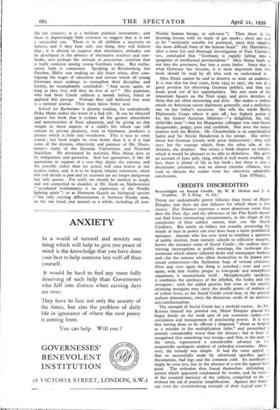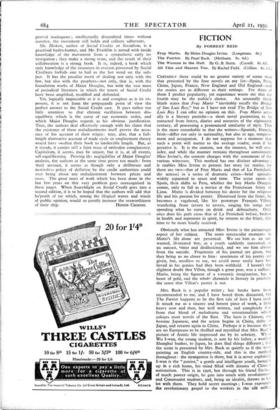CREDITS DISCREDITED
THERE are undoubtedly graver fallacies than those of Major Douglas, and there are also fallacies for which there is less excuse. Der Stiirmer expresses a more disastrous error than does the New Ake, and the advocates of the Flat Earth theory can find fewer extenuating circumstances, in the shape of the complexity of their subject matter, than can the Social Crediters. But surely no fallacy not actually possessing the minds of men in power can ever have been a more pestilential nuisance. Anyone who has ever tried to ventilate a question of public interest, from nursery schools to collective security, knows the nuisance value of Social Credit ; the endless time- wasting interruptions at public meetings, the irrelevant dis- sertations which clutter editorial desks and wastepaper baskets, and—for the unwary who allow themselves to be drawn into casual controversy—the Serbonian bogs of textual criticism. Over and over again the thing is scotched ; over and over again, with that vitality proper to low-grade and amorphous organisms, it reconstitutes itself. Metaphorically speaking, it combines the attributes of the jellyfish, the hydra and the mosquito ; with the added proviso that even as the merely irritating mosquito may carry the deadly germs of malaria or of yellow fever, so the Social Credit creed may, as the present authors demonstrate, carry the disastrous seeds of an atavistic anti-intellectualism.
The strength of Social Credit has a twofold source. As Mr. Keynes himself has pointed out, Major Douglas placed his finger firmly on the weak spot of our economic order—the circulation and management of purchasing power. It is true that having done so he offered a diagnosis "about as helpful as a mistake in the multiplication table," and prescribed a remedy considerably worse than the disease ; but at least he recognised that something was wrong—and that, to the man in the street, represented a considerable advance on the suspectedly apologetic analysis of orthodox economies. More- over, the remedy was simple. It had the same appeal 25 that so successfully made by advertised specifics again rheumatism, bad legs and the common cold. Its justification might be even less, but in the absence of a test the appeal hel I good. The orthodox thus found themselves defending a system which appeared condemned by events, and, by reason of the essential intricacy of the subject, compelled to do so without the aid of popular simplification. Against this hand.- cap even the overwhelming strength of their logical case h
proved inadequate ; intellectually discredited times without number, the movement still holds and collects adherents.
Mr. Hiskett, author of Social Credits or Socialism, is a practised hydra-hunter, and Mr. Franklin is armed with inside knowledge of the movement from a sympathetic early in- vestigation; they make a strong team, and the result of their collaboration is a strong book. It is, indeed, a book which 'only knowledge of the resources in evasion possessed by Social Crediters forbids one to hail as the last word on the sub- ject. It has the peculiar merit of dealing not only with the law, but also with the prophets—not only, that is, with the foundation works of Major Douglas, but with the vast mass of periodical literature in which the tenets of Social Credit have been amplified, modified and defended.
Yet, logically impeccable as it is and complete as is its ex- posure, it is not from the propaganda point of view the perfect answer to the Social Credit case. It pays rather too little attention to that chronic vacillation between dis- equilibria which is the curse of our economic order, and which Major Douglas regards as his obvious justification. True, the authors deal effectively enough with his claim that the existence of these maladjustments itself proves the accu- racy of his account of their origin: true, also, that a full- length alternative account of trade cycle or employment theory would have swollen their book to intolerable length. But, as it stands, it carries still a faint trace of orthodox complacency. Capitalism, it seems, may be unjust, but it is, at all events, self-equilibrating. Proving the negligibility of Major Douglas' analysis, the authors at the same time prove too much: from their account, it seems as though only a deliberate and motiveless policy of deflation by the credit authorities could ever bring about any maladjustment between prices and costs. The great mass of work which has been done in the last few years on this very problem goes unrecognised in these pages. When Searchlight on Social Credit goes into a second edition, it is to be hoped that the authors will add that ha'porth of tar which, among the illogical waves and winds of public opinion, would so greatly increase the seaworthiness











































 Previous page
Previous page